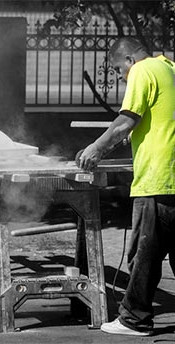SafeWork spreads silicosis message
 SafeWork NSW says it has dramatically increased awareness of silicosis and standardised practices of exposure prevention.
SafeWork NSW says it has dramatically increased awareness of silicosis and standardised practices of exposure prevention.
SafeWork NSW has visited every stone manufacturing business in the state and in addition has had 448 interactions with businesses in the tunnelling, domestic and civil construction, foundries, and building products industries.
Executive Director Specialist Services, Andrew Gavrielatos, said SafeWork NSW is just two years into a five-year strategy and is on course to drive down future cases of silicosis.
“The strategy is comprehensive and involves four key components - awareness, interaction, research, and legislation,” Mr Gavrielatos said.
“We’re approaching silica exposure from all angles, for example, in addition to a media campaign ‘Which Mask will you Wear?’, we’ve trained 184 inspectors to deliver education and compliance initiatives, we’ve held 48 industry forums, presentations and workshops, and we’ve instigated partnerships and research into better exposure prevention techniques.
“We’re also working with icare to improve knowledge of and access to health monitoring.”
Last financial year a total of 3,563 workers exposed to silica underwent health monitoring provided by icare’s Dust Diseases Care.
During inspector visits SafeWork NSW issued a total of 617 improvement and prohibition notices to ensure businesses comply with their work health and safety obligations around silica exposure.
Eighty per cent have been fully complied, with the majority of the remaining relating to workers having a health monitoring test where SafeWork NSW is awaiting confirmation from icare.
“As the number of notices complied with shows, silica exposure can be controlled by following simple steps,” said Mr Gavrielatos.
“Cut silica containing products with water, use ventilation and dust capture systems, wear a mask, and clean up with water or a H or M class vacuum.
“If you work with silica containing products and haven’t already made exposure prevention a priority, I urge you to visit the SafeWork NSW website for more information, to request an inspector visit, apply for a rebate or find out how you can provide health monitoring to your workers.”







 Print
Print